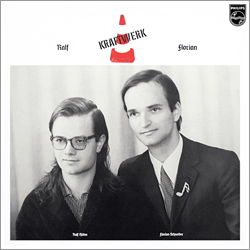Geniuses or piss artists? Innovators or serial one-hit wonders? I’ve always been fascinated by Kraftwerk but have never been sure where they stand in the whole scheme of things. Where would they have been without Bowie’s endorsement, for example? Whatever you think, you have to note that their impact was huge.
Krafwerk redfine music #1
Krafwerk redfine music #1
‘I remember somebody took us to a club in 1977 when Trans-Europe Express was out. It was in a loft club in New York, after hours; just as the DJ culture was starting when DJs began making their own records and their own grooves. This DJ was taking sections from Metal On Metal from Trans-Europe Express, so I thought, 'Oh, they're playing the new album'. But it went on for ten minutes! And I thought, 'What's happening?!' The track is only something like two or three minutes! Later, I asked the DJ; he had two copies of the record and he was mixing the two, and of course it could go on as long as people were dancing.’
Farley "Jackmaster" Funk
Many people think – wrongly – that Afrika Bambaataa’s "Planet Rock" used samples from Kraftwerk songs. While this was a major defining hit for hip hop and the birth of electro music, the song merely contains copied elements of "Trans-Europe Express" and "Numbers", as it would have required the early 80s equivalent of a super computer and approximately one shit load of money to generate the samples. Numerous artists have continued to sample and borrow from Kraftwerk's work subsequently, of course.
Krafwerk redfine music #2
‘I suppose we influenced Bowie; at least, that's what he told us. He told us that when he first came to Germany, he heard Autobahn continuously on his car radio. We met in Germany, when he was casting about for a place to work, and we suggested he try Berlin. So we provided inspiration of a sort - electronic spirituality! As far as the British artists you mentioned are concerned, we did several very long tours in England, where we met some of those musicians in clubs. For us, it was wonderful to experience this type of interest. Before, we had always been considered outsiders, and suddenly we were on the inside.’
Ralf Hütter
The band are legendarily reclusive and freaky, we are led to believe. The documentary mentions an incident between Johnny Marr and Karl Bartos, who explained that anyone trying to contact the band for collaboration would be told the studio telephone did not have a ringer, since during recording, the band did not like to hear any kind of noise pollution. Instead, callers were instructed to phone the studio precisely at a certain time, whereupon the phone would be answered by Ralf Hütter, despite never hearing the phone ring.
My guess is that this was originally aired in 2001 or 2002 (please confirm) as there is mention of the somewhat underwhelming Expo 2000 but not of the ‘comeback’ album Tour de France Soundtracks:
Download the bbc documentary:

File length: 28 mins
Size: 26 mb




1 comment:
Just came across this one. Thanks, looking forward to giving it a listen.
Post a Comment